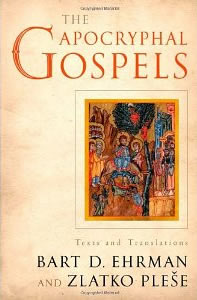Book Notes
 Bart D. Ehrman and Zlatko Plese, The Apocryphal Gospels; Texts and Translations (New York: Oxford University Press, 2011), 611pp.
Bart D. Ehrman and Zlatko Plese, The Apocryphal Gospels; Texts and Translations (New York: Oxford University Press, 2011), 611pp.
This volume collects "nearly all of the apocryphal Gospels originally written in Greek, Latin, and Coptic, in the best editions now available, and provided them with fresh and readable English translations." For Ehrman and Plese, "nearly all" means over forty texts organized into three sections — infancy gospels, ministry gospels, and then passion, resurrection and post-resurrection gospels, although it bears mentioning that scholars disagree about the very definition of "apocryphal." On the left-hand page is the text in its original language, while the right-side page contains the English translation. Each text is introduced with an overview of its historical, textual and literary matters.
As a matter of history, these texts are fascinating and invaluable, for they illustrate the breadth of the non-canonical literature about Jesus. As for why they were excluded from the (Protestant) canon, the authors note how that's a question driven by one's theological beliefs. This includes their own theological beliefs, and while Ehrman is a superb textual critic, he's also a polemical fundamentalist-turned-liberal-turned-agnostic who's published a number of books with sensational titles that must make his colleagues blush. So, Ehrman has a dog in this historical-theological hunt.
Some of these texts are 10–15 pages long, others are mere fragments. They date from the second or third century to the eleventh century, and are often anonymous. Almost every text has problems, many of them "intractable." Some texts are hyper-orthodox, others docetic or gnostic. The infancy gospels can be "crudely sensational." Sometimes there are "enormous textual alterations" that are impossible to reconstruct. Some of the apocryphal literature does not exist in any manuscript form but is reconstructed from patristic quotations. Almost "every imaginable answer" has been proposed to these sorts of questions. And proposed solutions to such controversies often fail, "in no small measure because they attempt, with almost no evidence, to explain the unknown by other unknowns" (267–268). Scholarly consensus about historical conclusions is thus often "lost in the mists of Christian antiquity."


